FORWARD OPERATING BASE SHANK, Afghanistan - As battle tactics in Afghanistan are adjusted to defeat the enemy, adaptability is a valuable asset to any Army unit involved in combat actions. At Forward Operating Base Shank, Task Force Brawler, 3rd Combat Aviation Brigade, TF Falcon, is displaying its adaptability by being as equally effective on the ground as they are in the air. With the creation of a civil affairs team, led by Capt. Douglas Gray, civil affairs officer in charge, Headquarters and Headquarters Company, TF Brawler, from Ojai, Calif., supports the ongoing counterinsurgency tactic by helping remote villages in the mountainous regions of Afghanistan.
The Task Force Brawler commander, Lt. Col. Robert Ault, saw a need for a section specifically tasked with identifying the needs of small villages isolated from major urban areas. After identifying the needs, the team then finds the means to solving those particular villages' problems.
The most effective government program to assist the Brawler civil affairs team, also known as the S-9 section, was the Commanders Emergency Response Program, or CERP. A relatively new program, CERP was first introduced to Army commanders in 2003.
The goal of the program is to win the trust of the civilian population and promote civil infrastructures in Afghanistan. It provides U.S. governmental appropriations directly to operational and tactical force commanders, enabling them to meet emergency needs of civilians in support of humanitarian operations.
The program began in Iraq, with the intent to provide local commanders the ability to fund small infrastructure projects. The program receives oversight from the Coalition Provisional Authority, and is budgeted from money seized during the Iraqi and Afghan conflicts. The amount of funding through CERP is determined by command level; for TF Brawler, they could apply $5,000 toward any single small-scale project.
Unlike most other programs in the Army, CERP spending allows a commander to decide how the funds are spent, as long as it fell within prescribed guidelines. This flexibility allows local commanders to more accurately identify problems that require fixing. For example, CERP monies could be used to help improve an irrigation system, refurbish public buildings, purchase medical supplies or build a school.
"The CERP funds have really helped the schools," said Sgt. 1st Class Russell Stacy, civil affairs noncommissioned officer in charge, HHC, TF Brawler. "Most villages don't have an effective school system in place, and therefore most schools don't operate with the necessary supplies, like books, paper and pens. [CERP] helps purchase these needed supplies, and that helps with providing a better education for the children."
But whereas CERP could help provide funding for small projects, actually connecting with the community and earning their trust was another issue. Fortunately, the successful partnership with TF Brawlers own ground unit and an Afghan National Army recon company provided a bridge between TF Brawler and the villagers. In turn, it is the Afghan Soldiers who will effectively link the locals with the provincial government.
"It is our partnerships through combined-action initiatives that have made us successful," said TF Brawler executive officer Maj. Craig Halsey. "Our partnerships with the ANA company, Task Force Nashmi from Jordan, the Czech Provincial Reconstruction team and the Afghan National Army Air Corps have provided the means to influence the battle space. The effects have been by, with, and through our partnered forces."
Armed with government-backed program funds and an American-Afghan partnered security force, the TF Brawler civil affairs team can now effectively enter a village, have a key leader engagement with the village elders and determine needs versus wants, and then later return with the necessary items.
Task Force Brawler's first successful application of CERP funds was to purchase and distribute supplies to a local village school. English-to-Pashtu dictionaries, pens, and paper were the most requested staple. The next project brought buckets of paint, brushes and, rolls of carpet in an effort to refurbish two mosques that were still in disrepair from the Soviets occupation in the 1990s.
"Mosques are the central hub for an Afghan community, and the state of the mosque reflects the spiritual state of the community," said TF Brawler chaplain Capt. Abraham Sarmiento. "In the Muslim religion, the mosque is a place that is visited frequently, where the people go to rekindle their spiritual strength. For the task force to aid in the refurbishment of a mosque displays to the villagers that we understand its importance to them and we respect their beliefs."
Although not allowed directly in the mosque, TF Brawler Soldiers assisted in transporting the materials directly to the mosque's doorstep.
Medical care in the remote regions was another issue for the S-9 team to assist with. As that most of the doctors in the Logar province work in more urban areas, outlying villages have little to no medical facilities available to them.
The team coordinated American and Afghan medics to set up one-day clinics where CERP-purchased medicine could be distributed.
"Because of the CERP funding, we were able to provide the villagers with basic necessities," said TF Brawler flight surgeon Capt. Caton Hill. "Every day items we take for granted, like shampoo, toothpaste, even baby formula are much needed items in those remote places. The (CERP) program allows us to purchase these things for them; that, to me, is a potent effect."
In some cases though, the village elders would ask for something either out of the scope of CERP or a project that cost more than the $5,000 allotted to small projects. In those instances, the S-9 team would help the villagers by showing them the necessary steps required to file requests through provincial government offices.
For example, one village requested that the TF Brawler S-9 team contact a local contractor and force the company to complete an Afghan government-sponsored project started then stopped at a local school. With a little research, the team returned days later and provided the village elders a phone number where complaints could be registered with the provincial government.
In the four months since conception, the TF Brawler S-9 shop has delivered school supplies for more than 1,000 students, distributed medicine to more than 900 villagers, delivered more than 96,000 pounds of concrete for irrigation improvement projects, and purchased enough carpet and paint to refurbish three mosques. But according to Mace, the most important statistic is the one village that now attends weekly provincial meetings.
"The villagers are taking a very proactive role in their own development by working with the leaders of the provincial government," said 2nd Lt. Evan Mace, assistant S-9 officer. "Our main goal has been to make these villages non-dependent on aid from Coalition forces. In this one village, it appears we are having success with that thus far."
The end-state for TF Brawler and its civil affairs team is to essentially work their way out of a job, and in the process, ultimately become effective in the little time that they are in Afghanistan.
By empowering the local populace with the ability to address their own issues with the government of Afghanistan, TF Brawler works to accomplish a goal Lt. Col. Ault set down from the onset - that the task force make a difference by creating long-term effects in the battle space.
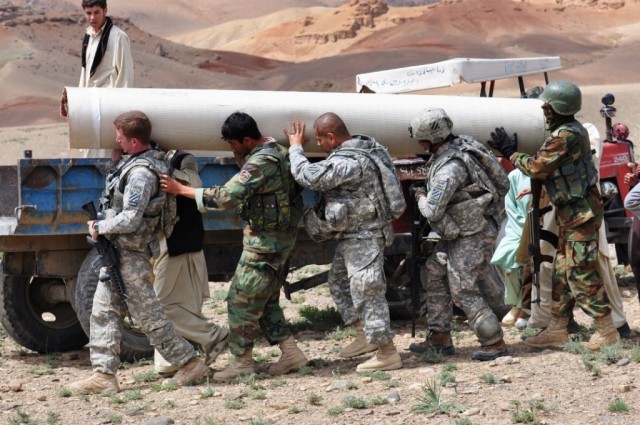
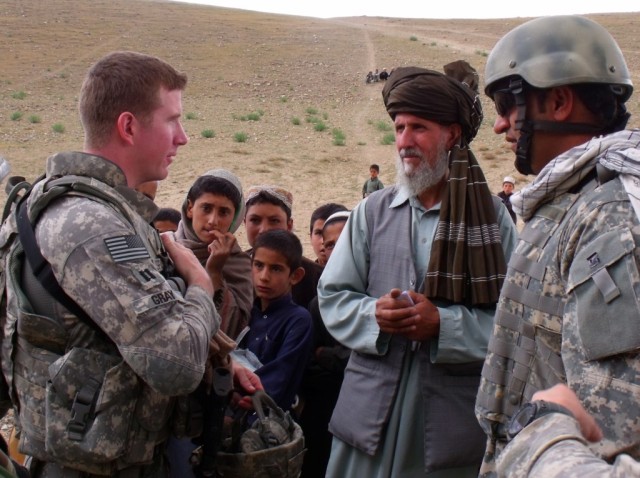
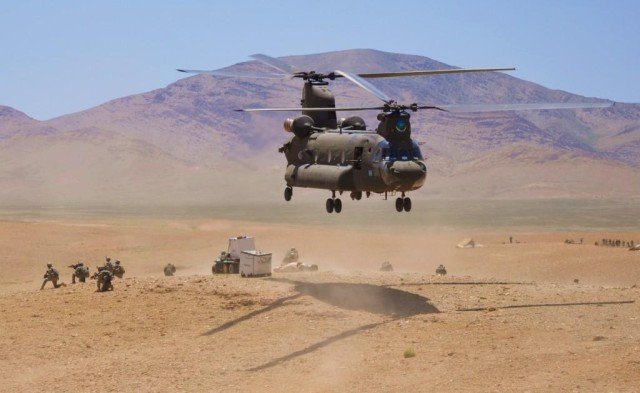
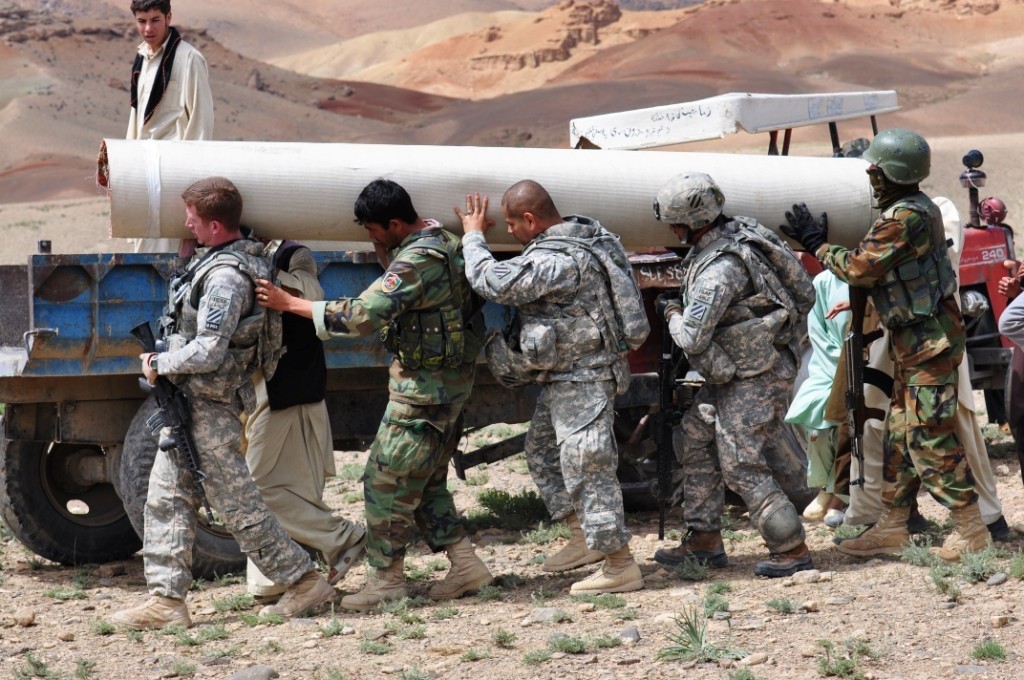

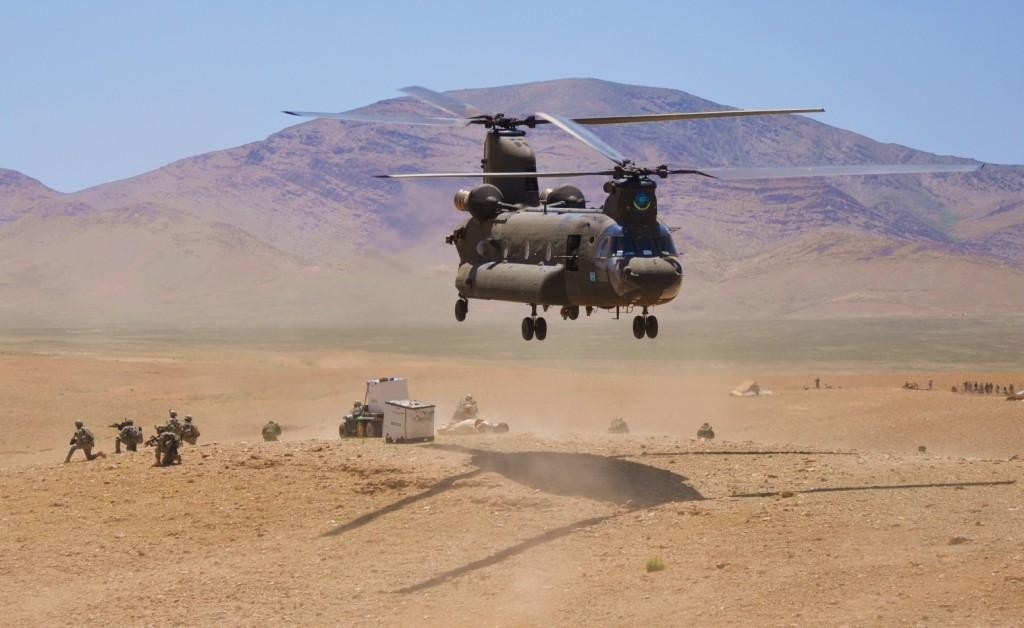
Social Sharing